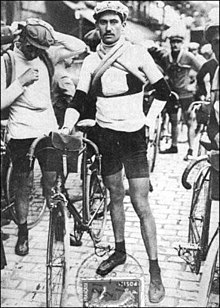Henri Pélissier

Henri Pelissier, 1919
|
|
| Personal information | |
|---|---|
| Full name | Henri Pélissier |
| Born |
22 January 1889 Paris, France |
| Died | 1 May 1935 (aged 46) Dampierre, Yvelines, France |
| Team information | |
| Discipline | Road |
| Role | Rider |
| Major wins | |
|
|
Henri Pélissier (pronounced: [ɑ̃.ʁi pe.li.sje]; 22 January 1889 – 1 May 1935) was a French racing cyclist from Paris and champion of the 1923 Tour de France. In addition to his 29 career victories, he was known for his long-standing feud with Tour founder Henri Desgrange and for protesting against the conditions endured by riders in the early years of the Tour. He was killed by his lover with the gun that his wife had used to commit suicide.
Pélissier was one of four brothers, three of whom became professional cyclists. He began racing professionally in 1911 and amassed important victories before the First World War, including the 1912 Milan–San Remo and three stages in the 1914 Tour de France.
After the war he resumed competition, winning Paris–Roubaix in 1919 and the second (and final) running of the Circuit des Champs de Bataille in 1920. He entered the Tour de France in 1920 and for the next four years. Before the 1921 Paris–Roubaix, Pélissier and his brother Francis demanded their sponsor pay them more than racers usually received. Their request was rebuffed and they rode as individuals without team support. Henri Desgrange, organiser of the Tour de France, vowed that they would never again appear on the front page of his newspaper L'Auto, only to eat his words when Pélissier emerged the champion.
The Pélissier family came from the Auvergne region of central France. They were cattle farmers and moved to Paris to run a farm there.
...
Wikipedia
